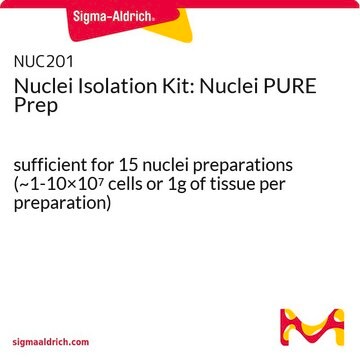All Photos(1)
About This Item
Linear Formula:
NaCl
CAS Number:
Molecular Weight:
58.44
Beilstein:
3534976
MDL number:
UNSPSC Code:
12352207
PubChem Substance ID:
Recommended Products
description
292.2 g/L sodium chloride
for research or for further manufacturing use
Quality Level
sterility
sterile; sterile-filtered
form
liquid
concentration
5 M
shipped in
ambient
SMILES string
[Na+].[Cl-]
InChI
1S/ClH.Na/h1H;/q;+1/p-1
InChI key
FAPWRFPIFSIZLT-UHFFFAOYSA-M
Looking for similar products? Visit Product Comparison Guide
Application
Sodium chloride solution has been used as a component of 10× binding buffer for glutamate carboxypeptidase II (NAALADase) assay.
Storage Class Code
10 - Combustible liquids
WGK
WGK 1
Flash Point(F)
Not applicable
Flash Point(C)
Not applicable
Certificates of Analysis (COA)
Search for Certificates of Analysis (COA) by entering the products Lot/Batch Number. Lot and Batch Numbers can be found on a product’s label following the words ‘Lot’ or ‘Batch’.
Already Own This Product?
Find documentation for the products that you have recently purchased in the Document Library.
Customers Also Viewed
Structural computational modeling of RNA aptamers
Xiaojun Xu
Methods, 103, 175-179 (2016)
Francis Kim et al.
JAMA, 311(1), 45-52 (2013-11-19)
Hospital cooling improves outcome after cardiac arrest, but prehospital cooling immediately after return of spontaneous circulation may result in better outcomes. To determine whether prehospital cooling improves outcomes after resuscitation from cardiac arrest in patients with ventricular fibrillation (VF) and
Alexander W Wyatt et al.
Genome biology, 15(8), 426-426 (2014-08-27)
Genomic analyses of hundreds of prostate tumors have defined a diverse landscape of mutations and genome rearrangements, but the transcriptomic effect of this complexity is less well understood, particularly at the individual tumor level. We selected a cohort of 25
Laurent Dortet et al.
Journal of clinical microbiology, 52(7), 2359-2364 (2014-04-25)
Multidrug-resistant Acinetobacter baumannii isolates, particularly those that produce carbapenemases, are increasingly reported worldwide. The biochemically based Carba NP test, extensively validated for the detection of carbapenemase producers among Enterobacteriaceae and Pseudomonas spp., has been modified to detect carbapenemase production in
Koji Tanaka et al.
Nature communications, 6, 6337-6337 (2015-02-27)
Pore-forming toxins (PFT) are water-soluble proteins that possess the remarkable ability to self-assemble on the membrane of target cells, where they form pores causing cell damage. Here, we elucidate the mechanism of action of the haemolytic protein fragaceatoxin C (FraC)
Our team of scientists has experience in all areas of research including Life Science, Material Science, Chemical Synthesis, Chromatography, Analytical and many others.
Contact Technical Service






